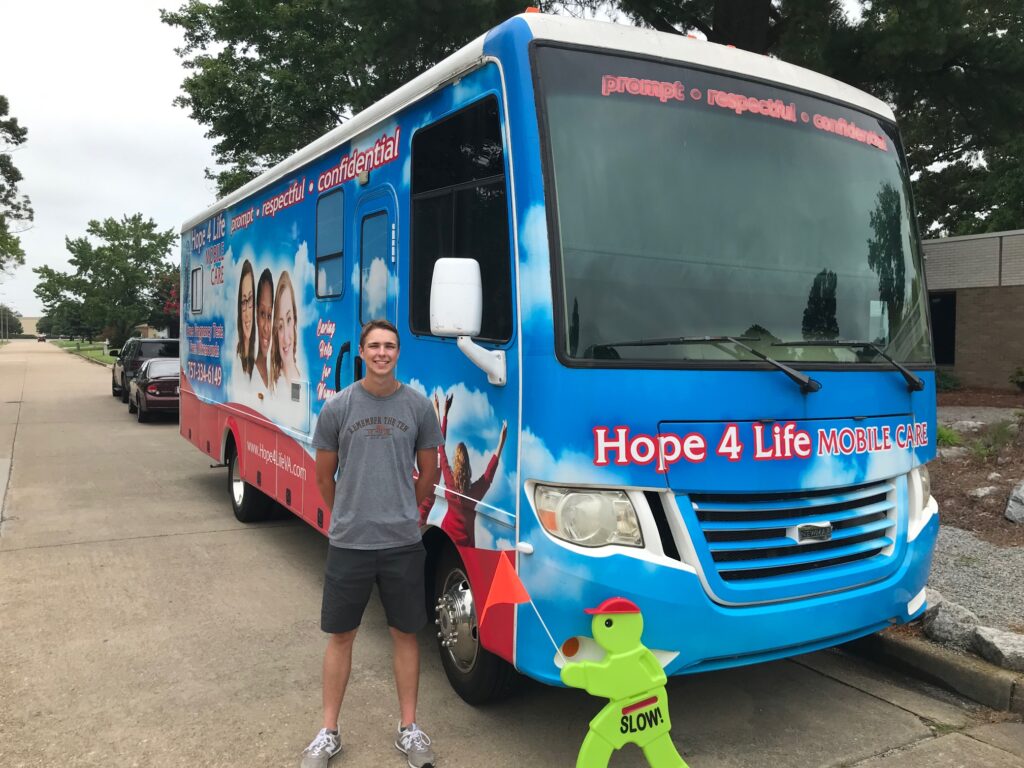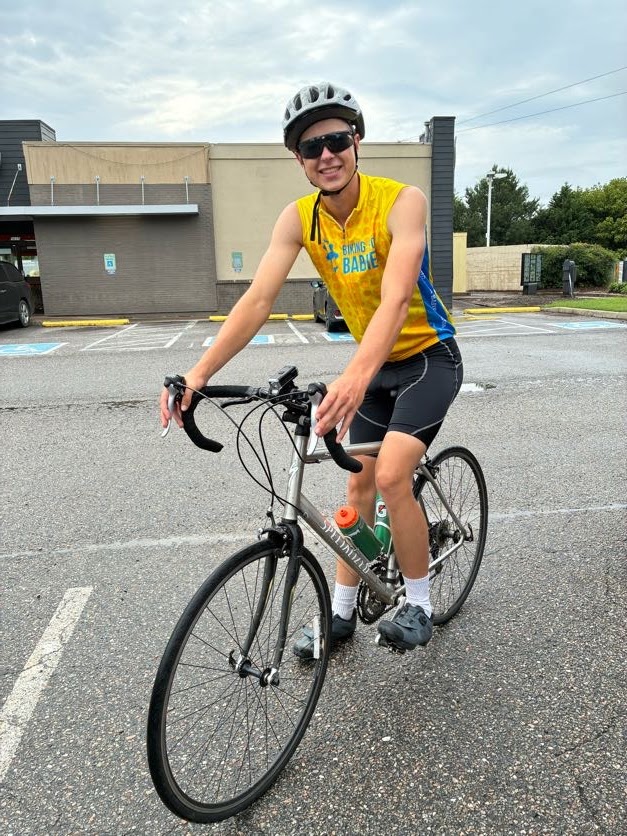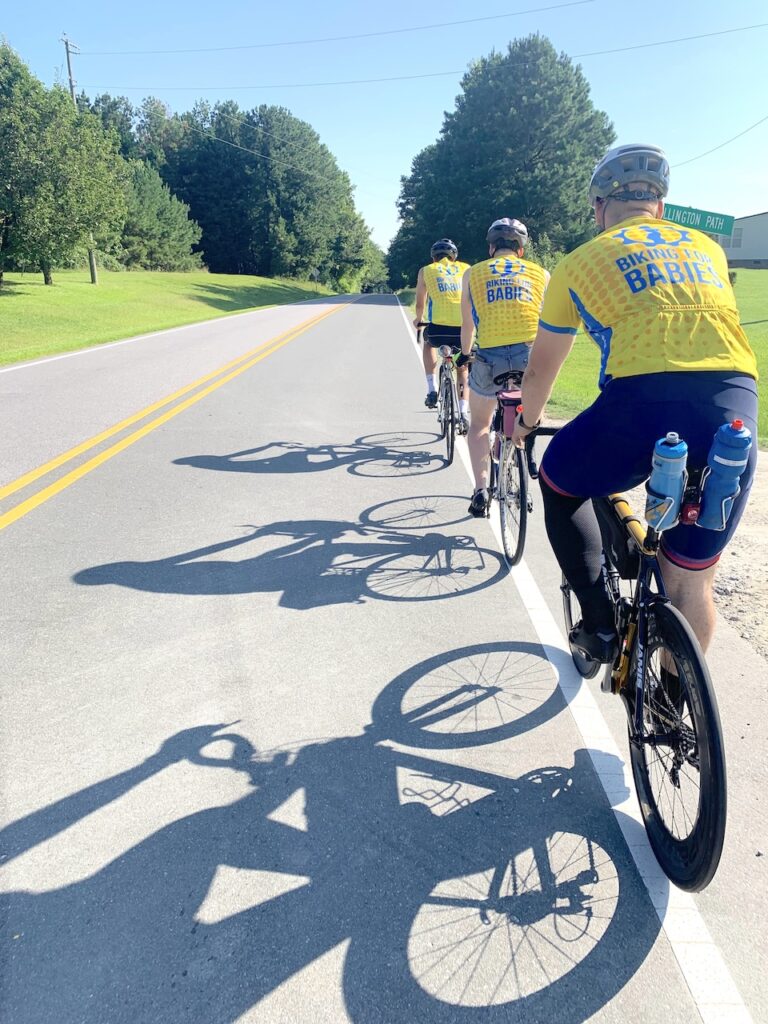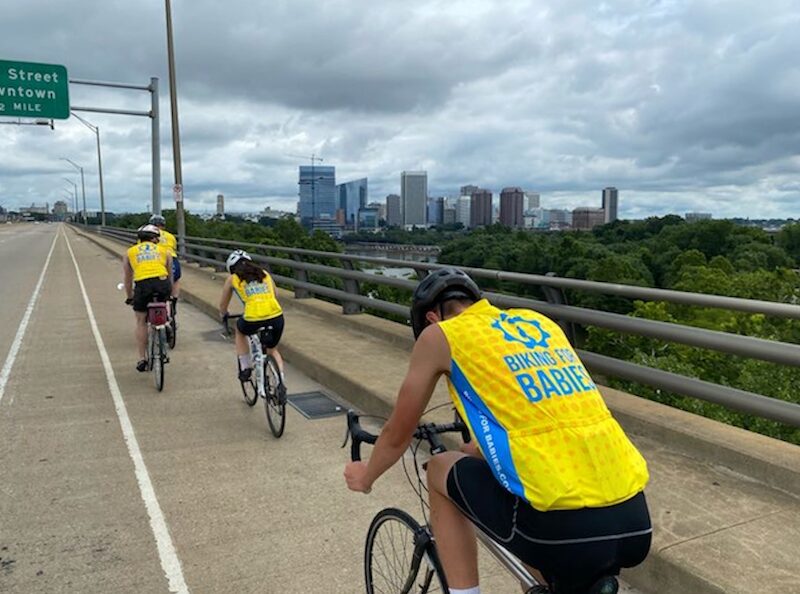Hope 4 Life, a pregnancy resource center based in Hampton Roads, is getting a boost from Biking for Babies.
Since 2009, Biking for Babies has formed over 200 missionaries and raised more than $2 million for pregnancy centers across the United States, said executive director Nikki Biese. This year, Patrick Nelson, a parishioner of St. Jerome, Newport News, spent July 14-19 cycling from Raleigh to Philadelphia with the Biking for Babies North Carolina Team.
Along the way, Nelson raised more than $3,000 for Hope 4 Life. Together, the North Carolina team raised over $25,000 and counting for pregnancy resource centers.
Hope 4 Life operates two medical buses in the Tidewater area. Every weekday, the buses are parked in front of one of three local abortion clinics. Two of the clinics are in Virginia Beach; the other is in Norfolk. The organization offers free ultrasounds on the medical bus, and volunteers help connect mothers considering abortion with other resources, including Catholic charities and maternity homes.
“We pay an ultrasound technician, and we have costs for the medical supplies and gas for the bus,” said Craig Eller, executive director of Hope 4 Life. “That runs us $45 per hour. So, every $90 Patrick raises, that’s two hours we can be out here.”
To put it another way, Nelson’s fundraising goal of $3,750 would buy one Hope 4 Life bus 83 hours in front of an abortion clinic. Though his cycling journey is complete, his fundraising page continues to receive donations.
On July 11, Nelson joined Eller and Hope 4 Life co-founder Louantha Kerr at one of the medical buses in Norfolk. Together, they helped two moms who were about to enter the abortion clinic change their minds.
“Things are going beautifully right now,” said Kerr. “We have a list of obstetricians in the area that we recommend. We talk to the moms about other resources – it depends on the individual, what their needs are.”
“We’re trying to save lives and save souls,” said Eller.
Besides Nelson, the North Carolina Team included four other cyclists and a support team that traveled the same route by van, providing water, snacks, and encouragement.
Eight other Biking for Babies teams around the country completed a similar long-distance journey in mid-July, together raising over $200,000 and counting for pregnancy resource centers.

Cyclists offer up suffering

Nelson did not own a bicycle until March, by which time he had already signed up for the journey. A vigorous training regimen had him ready to go by summertime – so much so that when the team stopped at the Cathedral of the Sacred Heart, Richmond, on July 15, he called their 70-mile trip “a light day.”
“We had to ford a river after some heavy rains, so that was a challenge,” he said. “But yesterday, we did 105 miles.”
For Jonathan Eger, from the Diocese of Johnstown, Pennsylvania, this was his third year as a Biking for Babies missionary. He said that the outstanding number of miles the team travels each day is easier to tackle in a group setting.
“I train almost exclusively alone, which is much harder,” said Eger. “When you’re drafting on the bikes, you’re gaining efficiency. And grinding alone for 6-8 hours is a lot harder than grinding with other people and having fun.”
“Everyone works together well and looks out for each other,” said Nelson.
On July 14, the day the team left Raleigh, the high was 92 degrees. The team beat the worst of the heat by departing in the early morning, but by midday, with no shade, some team members were starting to feel the burn.
Maddie Ferrero, from the Archdiocese of Baltimore, is in her fourth year as a missionary, but this is her first year as a cyclist. Around mile 80, she said, fatigue was kicking in.
“We were on a busy road with no shade, and we had 25 more miles to go,” said Ferrero. “I felt so done – I just wanted to get in the van. But I kept pushing.”

“Earlier in the day, I was texting with one of my friends who just had a baby,” Ferrero continued. “I was thinking about her in that moment and offering up my suffering for her.”
Ferrero added that her inspiration for returning as a missionary for a fourth year came from her experience working with children with cognitive disabilities.
“I work with students on the autism spectrum, students who have Down syndrome … and I saw the beauty of their lives, and working with them gave me a bigger capacity to love,” she said. “I wanted to share that with the world. I wanted to be more of an advocate for their lives.”
The other two cyclists on the North Carolina Team were Ryan Hagmann, from the Diocese of Spokane, and Paul Hendricks, from the Archdiocese of Baltimore.
Victoria Canales, a student at Catholic University of America, was on the support team this year.
“I make sure the riders have water, I help drive the van,” said Canales. “I’m here to support them in any capacity they need.”
Canales added that witnessing Eger, Ferrero, Hagmann, Hendricks and Nelson on the trail was a powerful experience.
“After seeing these guys being led by the Holy Spirit, cycling is something I’ll consider next year,” said Canales.
Catholic principles
To join Biking for Babies, Nelson said, “You don’t have to be Catholic – but a lot of the missionaries are.”
“There are a lot of Catholic principles spread throughout our formation,” said Ferrero.
One of those principles, said Biese, is the power of redemptive suffering.
“People ask, ‘Why the miles? Why so long? Do you understand what you’re asking these people to do in the heat of July?’” she said.
“It connects the dots for these young adults, that these women in crisis pregnancies feel they have nowhere to turn,” said Biese. “It’s important for us to put ourselves in vulnerable moments in which we have to lean on God.”

